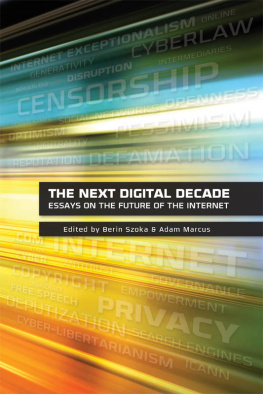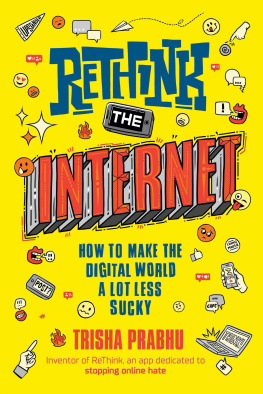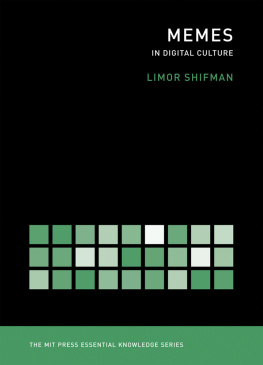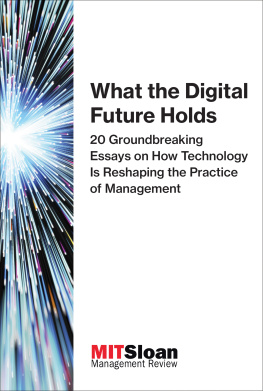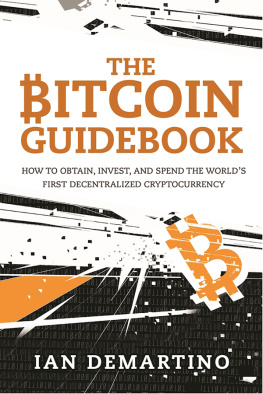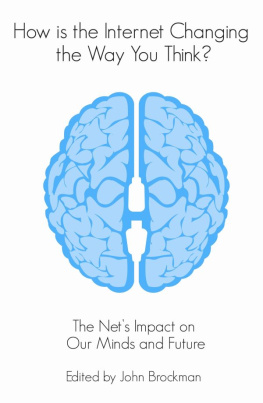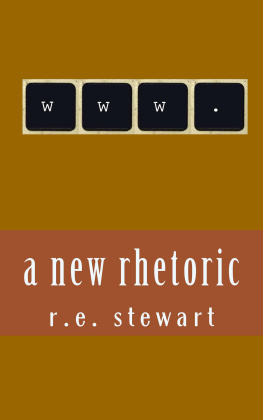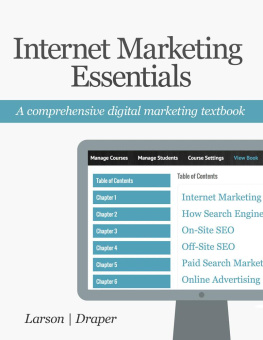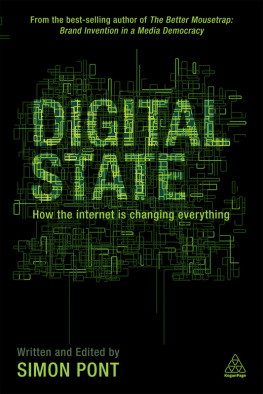Berin Szoka - The Next Digital Decade: Essays on the Future of the Internet
Here you can read online Berin Szoka - The Next Digital Decade: Essays on the Future of the Internet full text of the book (entire story) in english for free. Download pdf and epub, get meaning, cover and reviews about this ebook. year: 2011, publisher: TechFreedom, genre: Politics. Description of the work, (preface) as well as reviews are available. Best literature library LitArk.com created for fans of good reading and offers a wide selection of genres:
Romance novel
Science fiction
Adventure
Detective
Science
History
Home and family
Prose
Art
Politics
Computer
Non-fiction
Religion
Business
Children
Humor
Choose a favorite category and find really read worthwhile books. Enjoy immersion in the world of imagination, feel the emotions of the characters or learn something new for yourself, make an fascinating discovery.
- Book:The Next Digital Decade: Essays on the Future of the Internet
- Author:
- Publisher:TechFreedom
- Genre:
- Year:2011
- Rating:4 / 5
- Favourites:Add to favourites
- Your mark:
- 80
- 1
- 2
- 3
- 4
- 5
The Next Digital Decade: Essays on the Future of the Internet: summary, description and annotation
We offer to read an annotation, description, summary or preface (depends on what the author of the book "The Next Digital Decade: Essays on the Future of the Internet" wrote himself). If you haven't found the necessary information about the book — write in the comments, we will try to find it.
Berin Szoka: author's other books
Who wrote The Next Digital Decade: Essays on the Future of the Internet? Find out the surname, the name of the author of the book and a list of all author's works by series.
The Next Digital Decade: Essays on the Future of the Internet — read online for free the complete book (whole text) full work
Below is the text of the book, divided by pages. System saving the place of the last page read, allows you to conveniently read the book "The Next Digital Decade: Essays on the Future of the Internet" online for free, without having to search again every time where you left off. Put a bookmark, and you can go to the page where you finished reading at any time.
Font size:
Interval:
Bookmark:
ESSAYS ON THE FUTURE OF THE INTERNET
Edited by Berin Szoka & Adam Marcus

NextDigitalDecade.com
TechFreedom
techfreedom.org
Washington, D.C.
This work was published by TechFreedom (TechFreedom.org), a non-profit public policy think tank based in Washington, D.C. TechFreedoms mission is to unleash the progress of technology that improves the human condition and expands individual capacity to choose. We gratefully acknowledge the generous and unconditional support for this project provided by VeriSign, Inc.
More information about this book is available at NextDigitalDecade.com
ISBN for print edition: 978-1-4357-6786-7
2010 by TechFreedom, Washington, D.C.
This work is licensed under the Creative Commons Attribution-NonCommercial-ShareAlike 3.0 Unported License. To view a copy of this license, visit http://creativecommons.org/licenses/by-nc-sa/3.0/ or send a letter to Creative Commons, 171 Second Street, Suite 300, San Francisco, California, 94105, USA.
Cover designed by Jeff Fielding.
, Berin Szoka
, Berin Szoka
, Andrew Keen
, Adam Thierer
, Jonathan Zittrain
, Ann Bartow
, Adam Thierer
, Eric Goldman
, Hon. Alex Kozinski and Josh Goldfoot
, Tim Wu
, H. Brian Holland
, Mark MacCarthy
, Hal R. Varian
, Yochai Benkler
, Larry Downes
, Eric Goldman
, Milton Mueller
, David R. Johnson
, Robert D. Atkinson
, Frank Pasquale
, Mark MacCarthy
, Paul Szynol
, Frank Pasquale
, Geoffrey A. Manne
, James Grimmelmann
, Eric Goldman
, Michael Zimmer
, Stewart Baker
, Larry Downes
, John G. Palfrey, Jr.
, Christopher Wolf
, Evgeny Morozov
, Ethan Zuckerman
Berin Szoka
This book is both a beginning and an end. Its publication marks the beginning of TechFreedom, a new non-profit think tank that will launch alongside this book in January 2011. Our mission is simple: to unleash the progress of technology that improves the human condition and expands individual capacity to choose. This book also marks an end, having been conceived while I was Director of the Center for Internet Freedom at The Progress & Freedom Foundationbefore PFF ceased operations in October 2010, after seventeen years.
Yet this book is just as much a continuation of the theme behind both PFF and TechFreedom: progress as freedom. As the historian Robert Nisbet so elegantly put it: the condition as well as the ultimate purpose of progress is the greatest possible degree of freedom of the individual. This books twenty-six contributors explore this theme and its interaction with relentless technological change from a wide variety of perspectives.
Personally, this book is the perfect synthesis of the themes and topics that set me down the path of studying Internet policy in the late 1990s, and weaves together most of the major books and authors that have influenced the evolution of my own thinking on cyberlaw and policy. I hope this collection of essays will offer students of the field the kind of authoritative survey that would have greatly accelerated my own studies. Even more, I hope this volume excites and inspires those who may someday produce similar scholarship of their ownperhaps to be collected in a similar volume celebrating another major Internet milestone.
I am deeply grateful to Shane Tews, Vice President for Global Public Policy and Government Relations at VeriSign, who first suggested publishing this sort of a collection to commemorate the 25th anniversary of the first .COM domain name (registered in 1985) by asking what the future might bring for the Internet. Just as I hope readers of this book will be, she had been inspired by reading Who Rules the Net? Internet Governance & Jurisdiction, a collection of cyberlaw essays edited by Adam Thierer and Clyde Wayne Crews, and published by the Cato Institute in 2003. This book would not exist without the unconditional and generous support of VeriSign, the company that currently operates the .COM registry.
Nor would the book exist without the superb intellectual contributions and patience of our twenty-six authors, and all those who assisted them. I must also thank PFF Summer Fellows Alexis Zayas, Jeff Levy and Zach Brieg for their invaluable assistance with editing and organization, and Jeff Fielding for the books stunning cover artwork and design.
Most of all, I must thank Adam Thierer and co-editor Adam Marcus. The two and a half years I spent working closely with them on a wide range of technology policy topics at PFF were the highlight of my career thus far.
I look forward to helping, in some small way, to discover the uncertain future of progress, freedom, and technology in the next digital decadeand beyond.
Berin Szoka
December 16, 2010
Berin Szoka
While historians quibble over the Internets birth date, one date stands out as the day the Internet ceased being a niche for a limited number of universities, governments and military organizations, and began its transformation into a medium that would connect billions: On March 15, 1985, Symbolics, a Massachusetts computer company, registered This book celebrates that highly symbolic anniversary by looking not to the Internets past, but to its future. We have asked twenty-six thought leaders on Internet law, philosophy, policy and economics to consider what the next digital decade might bring for the Internet and digital policy.
Our ten questions are all essentially variations on the theme at the heart of TechFreedoms mission: Will the Internet, on its own, improve the human condition and expand individual capacity to choose? If not, what is required to assure that technological change does serve mankind? Do the benefits of government intervention outweigh the risks? Or will digital technology itself make digital markets work better? Indeed, what would better mean? Can We the Netizens, acting through the digital equivalent of what Alexis de Tocqueville called the intermediate institutions of civic society, discipline both the Internets corporate intermediaries (access providers, hosting providers, payment systems, social networking sites, search engines, and even the Domain Name System operators) and our governments?
Part I focuses on five Big Picture & New Frameworks questions:
1. Has the Internet been good for our culture and society?
2. Is the open Internet at risk from the drive to build more secure, but less generative systems and devices? Will the Internet ultimately hinder innovation absent government intervention?
3. Is the Internet really so exceptional after all, or willand shouldthe Internet be regulated more like traditional communications media?
4. To focus on one aspect of the Internet exceptionalism, has the Internet fundamentally changed economics? What benefits and risks does this change create?
5. Whoand what ideaswill govern the Net in 2020at the end of the next digital decade?
Part II tackles five Issues & Applications questions:
6. Should intermediaries be required to police moreor be disciplined in how they police their networks, systems and services? Whether one thinks the Internet is truly exceptional, and whether it has changed economics largely determines ones answer to these questions.
7. While debates about the role of online intermediaries and the adequacy of their self-regulation focused on net neutrality in the last digital decade, the battle over search neutrality may be just as heated in the next digital decade. Are search engines now the essential facilities of the speech industry that can be tamed only by regulation? Or are they engines of empowerment that will address the very concerns they raise by ongoing innovation?
Font size:
Interval:
Bookmark:
Similar books «The Next Digital Decade: Essays on the Future of the Internet»
Look at similar books to The Next Digital Decade: Essays on the Future of the Internet. We have selected literature similar in name and meaning in the hope of providing readers with more options to find new, interesting, not yet read works.
Discussion, reviews of the book The Next Digital Decade: Essays on the Future of the Internet and just readers' own opinions. Leave your comments, write what you think about the work, its meaning or the main characters. Specify what exactly you liked and what you didn't like, and why you think so.

